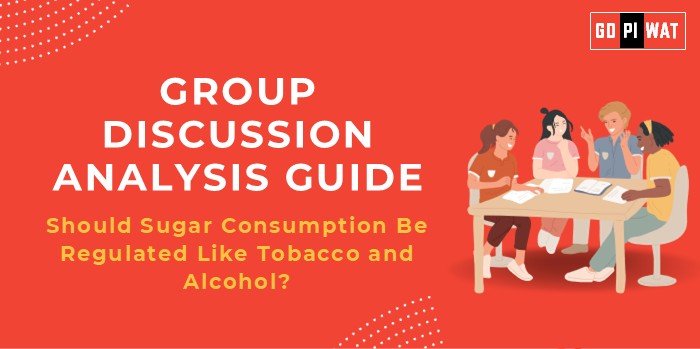📋 Group Discussion (GD) Analysis Guide
🍭 Should Sugar Consumption Be Regulated Like Tobacco and Alcohol?
🌐 Introduction to the Topic
Context Setting: Rising awareness about the health impact of sugar has sparked debates on whether it should be regulated like tobacco and alcohol. As lifestyle diseases escalate globally, sugar regulation could become a critical public health measure.
Topic Background: Excessive sugar consumption contributes to obesity, diabetes, and heart disease. While sugar is a staple in many diets, its addictive properties and societal costs draw parallels to tobacco and alcohol regulation.
📊 Quick Facts and Key Statistics
- Global Diabetes Prevalence: 537 million adults (2021); expected to rise to 643 million by 2030 (Source: IDF).
- Obesity Rates: 39% of adults worldwide are overweight; 13% are obese (Source: WHO).
- Sugar Taxes: Implemented in over 50 countries, including Mexico, UK, and India (on sugary drinks).
- Economic Costs: Non-communicable diseases (NCDs) linked to sugar cost $2 trillion globally (Source: WHO).
- Addiction Potential: Research shows sugar can activate the brain’s reward system, similar to addictive drugs.
🤝 Stakeholders and Their Roles
- Government: Policy regulation (taxes, limits on advertising), public health campaigns.
- Food Industry: Reformulating products, adhering to labeling laws.
- Healthcare Professionals: Advocacy, patient education on health risks.
- Consumers: Adoption of healthier dietary habits.
- International Bodies: WHO recommendations, global research dissemination.
🏆 Achievements and Challenges
- Achievements:
- Public Health Interventions: UK’s sugar tax cut soft drink sugar content by 29% in three years.
- Behavioral Changes: Mexico saw a 7.5% decline in sugary drink consumption after tax introduction.
- Research and Awareness: Increased studies on sugar’s health impact have informed public discourse.
- Challenges:
- Industry Pushback: Resistance from powerful food and beverage lobbies.
- Consumer Behavior: High dependence on sugar and cultural habits.
- Global Comparison: Countries like Chile have succeeded with stricter labeling laws, while others lag.
- Case Study: India’s lack of widespread regulation leaves obesity rates climbing, with a projected $12 billion burden by 2025.
📋 Structured Arguments for Discussion
- Supporting Regulation: “Regulating sugar consumption is essential to curb the epidemic of lifestyle diseases and reduce healthcare costs.”
- Opposing Regulation: “Unlike tobacco and alcohol, sugar is not inherently harmful in moderation; regulation infringes on personal freedom.”
- Balanced View: “Regulating sugar is critical for public health, but it must be complemented with consumer education and industry accountability.”
🎯 Effective Discussion Approaches
- Opening Techniques:
- Data-driven start: “537 million people have diabetes globally—should sugar remain unregulated?”
- Question format: “Is sugar the new tobacco?”
- Case study opening: “Mexico’s sugar tax resulted in a significant consumption drop—should others follow?”
- Counter-Argument Handling:
- Example: “While moderation is key, statistics show most consumers exceed healthy limits due to aggressive marketing.”
🔍 Strategic Analysis (SWOT Framework)
- Strengths: Established health research; successful sugar taxes.
- Weaknesses: Implementation barriers, cultural resistance.
- Opportunities: Public health improvement, reduced healthcare costs.
- Threats: Industry pushback, black market sugar sales.
📌 Connecting with B-School Applications
- Real-World Applications: Policy analysis in public health, marketing strategies for FMCGs.
- Sample Questions:
- “What can B-schools do to encourage sustainable health initiatives?”
- “Evaluate the role of marketing in sugar consumption patterns.”
- Insights for Students: Understanding the intersection of public policy and business, navigating ethical dilemmas in marketing.


